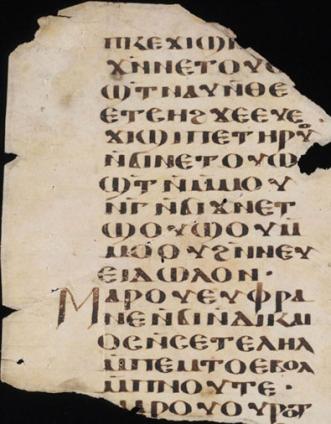
From Shenoute, Discourses book 8 (White Monastery codex ZD, page 193a; Yale Beinecke Library MSS Coptic 2, leaf 1 recto), in Coptic. Apa Shenoute (A.D. 348–465) is one of the earliest known leaders of Christian monasticism. He headed a large federation of two monasteries and a nunnery situated halfway up the Nile Valley in Egypt in the fourth and fifth centuries. Shenoute gives us a fascinating picture of Christian coenobitic monasticism in its third generation of existence. His extensive monastic writings, of which almost 4,000 pages survive in numerous libraries around the world, are the most important first hand evidence for the spiritual and social life of early coenobitic monks, and this evidence is largely unknown to historians. An international project to prepare a first complete edition of his surviving works was organized by the Yale Beinecke Rare Book and Manuscript Library in March, 2000; it is headed by an alumnus of the Ancient Christianity doctoral program. Yale faculty and graduate students in Ancient Christianity have been involved in editing and interpreting this material: see Bentley Layton, “Social Structure and Food Consumption in an Early Christian Monastery: The Evidence of Shenoute’s Canons and the White Monastery Federation A.D. 385–465,” in Le Muséon 115 (2002), 25–55.